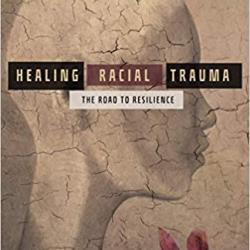This week, the inside of my church is a shanty town. The narthex is a patchwork of donated refrigerator and Amazon cardboard boxes; leaning, lopsided, and beautiful. “It’s a castle!” I grinned, locking eyes with the kindergartner kneeling next to her creation. She returned my smile with one highlighted with chocolate frosting stains from her recently devoured cupcake. “It’s not a castle,” she beamed, “it’s our mansion!” With that, she grabbed her friend’s hand and giggled as they disappeared inside. A teenaged boy labored diligently on the outside, carving out a cardboard window with a utility knife. Hunching across from him, a middle-aged man reinforced the outside by frantically adding duct tape. “Hold still,” he laughed, “or it’s all coming down!”
I paused for a moment, scanning the bedraggled scene of tangled duct tape, cardboard, and joy. It reverberated across a lobby that was, most days, empty. But not this week, due to the partnership between churches in the area, with empty space, and organization determined to fill it with locals needing shelter. This week, three families on the margins of homelessness were invited to eat, sleep, and play within our church walls. In a matter of hours, Sunday school rooms became bedrooms, a vestibule housed dinner tables dressed in checkered tablecloths, and the narthex, a playground where children played Monopoly, pushed matchbox cars, and constructed cardboard mansions. This was, for the next seven days, their (literal) church home.

“Jesus replied, ‘Foxes have dens and birds have nests, but the Son of Man has no place to lay his head.’” (Matthew 8:20)
Jesus . . . was homeless.
My minivan is an incubator for revelation, and often my sole space for solitude. (This is also true of my bathroom—as long as my kids don’t know I’m there.) I grasped the steering wheel tighter on the drive home, ashamed of my belated epiphany: Jesus was transient, yes, but still more, severed from his heavenly home. Homeless in the very world he had formed.
My thoughts drifted back and forth, rewinding scenes from the week. I saw children with stomachs full and the promise of a place to sleep. For a few hours each evening, they had the luxury of being lost in play. I saw their parents, looking on from across the room. Their bodies bowed under the strain of long shifts, pavement pounding, or delayed approvals and reels of red tape. The weight of ever-evasive permanency pressed heavily on them. Yet they longed for home.
Jesus did too.
“‘I was a stranger and you invited me in.’” (Matthew 25:35)
Between bites of spaghetti and topped-off lemonade spill the stories of our guests. A long-term illness, a poor decision, a dad in prison, or a mom who left. I sit table-side listening and wondering how this could easily have been me—sitting across from a stranger, narrating a life of insurmountable odds.
Then I realize, it is me.
I’ve often observed God’s heart for society’s edges. The Incarnation birthed the one who became flesh and felt it too. Jesus is a High Priest who lived the pain of the margins. Despised and rejected, he co-exists with “the least of” these—the stranger, hungry, thirsty, naked, imprisoned, and sick. (Matthew 25). I’ve been called to serve here, but never before had I imagined myself on the roster.
At his life’s end, Martin Luther wrote, “This is true. We are all beggars.” Whether we see our poverty or not, we are, in fact lost and bankrupt—wholly dependent on a Savior to settle our debts. Jesus meets us at the margins and calls us to return there too.
“In my Father’s house are many mansions: if it were not so, I would have told you. I go to prepare a place for you.” (John 14:2 KJV)
The box forts lining the narthex lay quiet, their young architects long-since retired to respective Sunday school rooms for bed. I sidled between each, scooping up stray cardboard and duct tape along the way. In the little girls’ mansion, I found her new quilt, stitched by church volunteers. Borrowed toys from the night’s activities were tucked inside, along with a miniature pumpkin picked from the church community garden. Other structures housed the same: A small picture, a light—even a middle-school football jersey fit over shoulder pads.
For a few days, these cardboard creations offered the promise of home. In a few days, the forts will be broken down, and these families will follow a calendar to the next host church.
How temporary, I think, are the dwelling places on earth. How enduring our longing for home.
Photo credit: Nichole Woo













